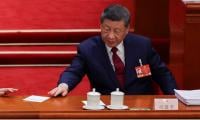So shall you reap
Part - II
Side-effect
The writer is a poet and author based in Islamabad.
While Muslim societies were being radicalised with the encouragement of secular Western powers from the 1950s to the 1980s, for causes and reasons elaborated in the previous piece, the Western powers either assumed that nothing would happen in their own backyard or were complacent that they would be able to deal with it effectively and swiftly.
During these same years, when Muslim societies were being radicalised, the number of Muslims was incrementally growing in the West as a result of economic migration, again encouraged by the West due to its commercial and industrial needs, or due to those seeking political refuge from the repressive post-colonial regimes of Asia and Africa, also supported by the same powers in many instances.
Policymakers in the West thought then that the opportunities offered in their countries and the respect for individual human rights observed within their societies would prevent Muslim youth living in Europe and North America from being radicalised. Or that they would continue to incentivise and mainstream them through increased provision of services, considering new entrants in the society as a ‘social work project.’ Unfortunately, both these ideas were found to be limited in their success.
The first generation of immigrants was grateful for the opportunities and luxuries living in the West brought to them because they had the experience and knowledge to compare their life in the West with their former life in their native places. But those born and raised in the West had neither experience nor reason to compare their life with that of their parents or grandparents in their native countries.
Besides, the fundamental rights guaranteed to the immigrants were not only taken for granted by their new generations as they had been naturalised, the conservative and orthodox preachers and politicos working in these communities took full advantage of the loopholes within the liberal value system in the West to further their radical agenda. This happened at a steady pace.
What we see in many countries of the West today is the ability of radicalised youth, both women and men, to inflict violence and disrupt normal life. While the majority of Muslims have nothing whatsoever to do with them, the extremist forces have created a critical mass of activists within these societies with linkages across countries and continents.
Here we come to Pakistan. There is this remarkable analogy to be drawn between what the Western powers did to encourage radicalisation in Muslim societies through their policy preferences and reaping today what they had sown, and what powers that be in Pakistan did to encourage radicalisation within their own society.
In terms of political categories and historic terminologies, ‘secular’ is a difficult term to be used for dominant institutions and the mainstream leadership in Pakistan – since almost all if not all owe allegiance to their divine faith. However, in practice a vast majority of them – and institutions led by them – are ‘this worldly’ or ‘secular’ in nature.
Even worse, they are hypocritical when it comes to their own personal lives and social preferences and what they continue to profess and promote for common people at large.
First, it was the coterie of feudal politicians and British-trained civil servants who decided to use religion to their benefit, thinking of it as a means to control the dispossessed and disadvantaged majority. But to give people like Sardar Nishtar their due, some of them were also committed to promoting religion as a unifying factor in all earnestness. But soon after, it was the military generals in cahoots with politically motivated clergy who used religion to keep command over the lives and thinking of people.
The aim was always to perpetuate power and for some time, in the wake of the Afghan Jihad of 1980s, to expand that power over other countries and territories, peoples and societies. A lot happened in the intervening times and a lot continues to happen on the sides but let us discuss the major trends.
These socially liberal and politically conservative people at the helm of affairs (Bhutto being an exception, but doing the same when cornered) encouraged radicalisation using four public and policy spaces: political platform, legislation, curriculum and non-state organisation. Please note that their political conservatism is more about safeguarding the commercial and economic interests of the elite and less about people leading lives of piety and altruism. And most, if not all, lead a liberal personal and social life.
But when it came to their political positions taken in public, they sided with the clergy, initially to use them to harness public sentiment in their favour and then to appease the clergy when it gained enormous strength due to perpetual political support to their ideas by these mainstream political leaders. So you have the Nawabzada Liaquat Ali Khan-led first legislature passing the ‘Objectives Resolution’ soon after the passing of the founder of the nation.
You have Bhutto declaring Friday a holiday, prohibiting alcohol and banning betting and gambling virtually a hundred days before his ouster. You have the incumbent Prime Minister Nawaz Sharif attempting to pass the Shariat bill during his earlier tenures. Today, we also have Imran Khan who perpetually refers to his own understanding of Islamic history and uses religion to make political gains.
Even someone like Altaf Hussain begins and ends his speeches at times with religious quotations. Who in this country does not know what these leaders and their parties, their legislators and close aides, believe in and practice in their personal lives and social interactions?
Come General Ziaul Haq. Zia institutionalised aspects of orthodox religion through legislation like no other. He introduced laws which were seen as lopsided even by learned Islamic scholars and made the ‘Objectives Resolution’ a substantive part of the constitution. For Zia, religiosity in society was needed for him to survive in his position. The ideas he promoted were neither practised then nor are now subscribed to by his own kith and kin.
General Musharraf, who took over political power after a decade-long civilian interlude which was both uneasy and marred with interferences, hoodwinked us much. He announced himself to be a moderate when it came to matters of faith. But when he went for a referendum to get confirmed as the president of the Republic in 2002, wearing a turban in a political rally in Lahore, he also raised religious slogans.
Also, during both these military dictatorships, major investments were continued to be made in non-state organisation of Pakistani young men into religious outfits. They were mobilised to serve the causes in Afghanistan and Kashmir or counter the Iranian narrative, promoted by another theocracy with a different design in the neighbourhood. Also, their policies plunged into the conflict of the Middle East. The poor and the disadvantaged provided cannon-fodder to meet the objectives set forth.
But when you create organisations, over the years they take a life of their own. On the basis of our experience from the past few years, it will be sheer complacency and overconfidence if someone still thinks that the Pakistani state will be able to continue to control and manoeuvre those who seemingly listen to the powers that be today.
As far as education through a certain kind of curriculum and syllabus and public messages through media and pulpit are concerned, myopia, bigotry, superiority complex and a selective sense of history have been promoted for too long. People did not determine what is to be taught to their children in school or madressahs, state institutions did. So why blame our youth today – whether they went to schools or had no choice but attend madressahs?
While the vast majority of political parties and the military as an institution, most of the civilian bureaucracy and a significant number of opinion leaders lead a different life, what they have promoted among large parts of society has come to haunt them.
To be continued
Email: harris.khalique@gmail.com
-
 Nicole Kidman's Daughter Sunday Rose Under Intense Backlash Post-Keith Urban Divorce
Nicole Kidman's Daughter Sunday Rose Under Intense Backlash Post-Keith Urban Divorce -
 Teddi Mellencamp Reveals Medication Side-effects Landed Her In The Hospital
Teddi Mellencamp Reveals Medication Side-effects Landed Her In The Hospital -
 Chase Stokes Calls Out Morgan Evans Over Comments On Kelsea Ballerini Split
Chase Stokes Calls Out Morgan Evans Over Comments On Kelsea Ballerini Split -
 Elon Musk Says Legal Pressure Forced Him To Pay Full Price For Twitter
Elon Musk Says Legal Pressure Forced Him To Pay Full Price For Twitter -
 Sarah Ferguson’s Downfall & Housing Crisis: Pals Make A Decision On Radioactive Ex-Duchess
Sarah Ferguson’s Downfall & Housing Crisis: Pals Make A Decision On Radioactive Ex-Duchess -
 Taylor Swift Faces Awkward Situation Ahead Of Her Wedding To Travis Kelce
Taylor Swift Faces Awkward Situation Ahead Of Her Wedding To Travis Kelce -
 Anthropic, Pentagon Resume Talks On ‘high Stakes’ AI Defense Deal
Anthropic, Pentagon Resume Talks On ‘high Stakes’ AI Defense Deal -
 OpenAI Annualized Revenue Hits $25 Billion Milestone Amid Global Adoption Surge
OpenAI Annualized Revenue Hits $25 Billion Milestone Amid Global Adoption Surge -
 Princesses Beatrice, Eugenie’s Parents Hurt Their Future With William, Kate: ‘The Knives Are Out’
Princesses Beatrice, Eugenie’s Parents Hurt Their Future With William, Kate: ‘The Knives Are Out’ -
 Billy Porter Claims He Came Back From The Dead Amid Sepsis Battle
Billy Porter Claims He Came Back From The Dead Amid Sepsis Battle -
 Jason Dickinson Reportedly Headed To Oilers In Trade With Chicago Blackhawks
Jason Dickinson Reportedly Headed To Oilers In Trade With Chicago Blackhawks -
 Harry Styles Hints He's Ready For Marriage And Family Life
Harry Styles Hints He's Ready For Marriage And Family Life -
 David Harbour’s Ex Faced Extreme Humiliation At Lily Allen’s Producer's Birthday Bash
David Harbour’s Ex Faced Extreme Humiliation At Lily Allen’s Producer's Birthday Bash -
 China Targets Tech Innovations Amid High Stakes Rivalry With US: Key Strategies Explained
China Targets Tech Innovations Amid High Stakes Rivalry With US: Key Strategies Explained -
 Pacers Vs Clippers: Kawhi Leonard Powers Clippers Past Pacers For Third Straight Win
Pacers Vs Clippers: Kawhi Leonard Powers Clippers Past Pacers For Third Straight Win -
 Scientists Build Tiny AI Brain Model Using Monkey Neurone Data
Scientists Build Tiny AI Brain Model Using Monkey Neurone Data



